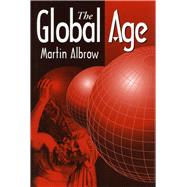The Global Age
, by Albrow, Martin- ISBN: 9780804728690 | 0804728690
- Cover: Hardcover
- Copyright: 1/1/1997
Taking issue with those who see recent social transformations as an extension of modernity, the author contends that social theory must confront an epochal change from the modern era to a new era of globality, in which human beings can conceive of forces at work on a global scale, and in which they espouse values that take the globe as their reference point. The book begins by assessing the problems of writing about modernity, showing how narratives of an endlessly self-perpetuating modern age were intrinsic to the "modern project," the attempt by Enlightenment philosophers to transform the everyday world in accord with science and logic under the auspices of the nation-state. Now we are beginning to realize that the nation-state and the modern project cannot renew themselves endlessly through expansion. Instead, the author contends, the age has culminated in its own dissolution, and globality has supplanted modernity as the basis for action and social organization. In theorizing the global age, he considers the worldwide environmental consequences of aggregate human activities, the reconception of human security in the age of nuclear weapons, technological advances in communication systems, the rise of a global economy, and the growing reflexivity of global consciousness, as people and groups begin to refer to the globe as the frame for their beliefs. The book concludes by examining the consequences of the Global Age thesis for politics, identifying a new popular construction of the state that the author terms "performative citizenship." In the modern age, the nation-state was the central power and citizens were beneficiaries of that power, with rights and duties. In the global age, citizens respond to the lack of central power by creating, or performing, the state themselves. The global managerial class uses the skills learned in the bureaucracy of the nation-state to bring pressure on national governments in the interests of global economic, environmental, or human-rights issues.







